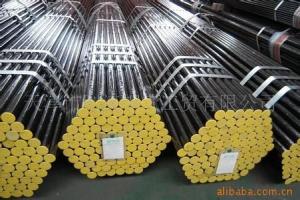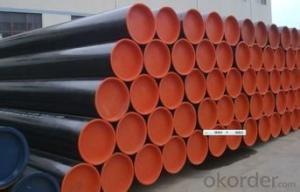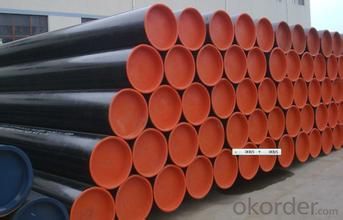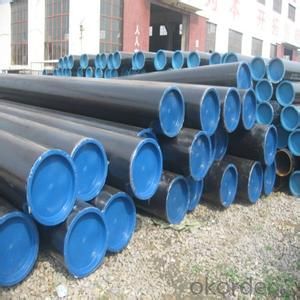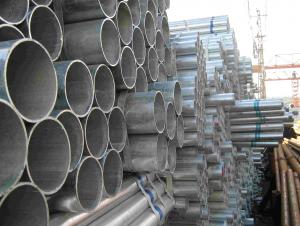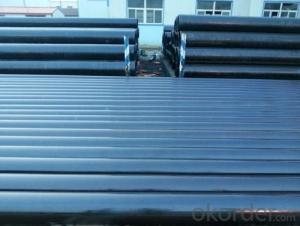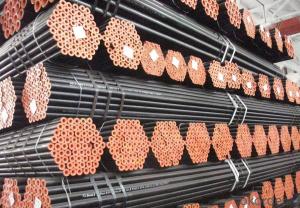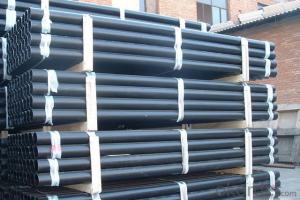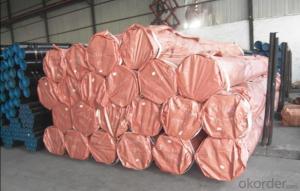Seamless Steel Pipe API Certificate Gr B
- Loading Port:
- Tianjin
- Payment Terms:
- TT OR LC
- Min Order Qty:
- 35 m.t.
- Supply Capability:
- 8000 m.t./month
OKorder Service Pledge
OKorder Financial Service
You Might Also Like
1、Structure of Seamless Steel Pipe API Certificate Q235 Gr B
Seamless pipe is formed by drawing a solid billet over a piercing rod to create the hollow shell. As the manufacturing process does not include any welding, seamless pipes are perceived to be stronger and more reliable.
2、Main Features of Seamless Steel Pipe With API Certificate Gr B
• High manufacturing accuracy
• High strength
• Strong heat dissipation ability
• Good visual effect
3、 Seamless Steel Pipe API Certificate Q235 Specification Gr B:
Standard | GB, DIN, ASTM ASTM A106-2006, ASTM A53-2007 |
Grade | 10#-45#, 16Mn 10#, 20#, 45#, 16Mn |
Thickness | 8 - 33 mm |
Section Shape | Round |
Outer Diameter | 133 - 219 mm |
Place of Origin | Shandong, China (Mainland) |
Secondary Or Not | Non-secondary |
Application | Hydraulic Pipe |
Technique | Cold Drawn |
Certification | API |
Surface Treatment | factory state or painted black |
Special Pipe | API Pipe |
Alloy Or Not | Non-alloy |
Length | 5-12M |
Outer Diameter | 21.3-610mm |
Grade | 20#, 45#, Q345, API J55, API K55, API L80, API N80, API P110, A53B |
Standard | ASME, ASTM |
1) Material:20#(ASTM A 106/A53 GRB.API5LGRB,GB),45#,16Mn,10#.
2) Specification range:OD:21.3-610mm,WT:6-70mm,length:6-12m or according to the requirement of clients.
3) Excutive standards:GB,ASME API5L.ASTM A 106/A53,Despite of the above standards,we can also supply seamless steel pipe with standard of DIN,JIS,and so on,and also develop new products according to the requirements of our clients!
4) Surface:black lacquered,varnish coating or galvanized.
4、Packaging & Delivery
Packaging Details: | seaworthy package,bundles wrapped with strong steel strip |
Delivery Detail: | 15-60days after received 30%TT |
5、FAQ of Supply Seamless Steel Pipe API Certificate
①How is the quality of your products?
Our products are manufactured strictly according to national and internaional standard, and we take a test
on every pipe before delivered out. If you want see our quality certifications and all kinds of testing report, please just ask us for it.
Guaranteed: If products’ quality don’t accord to discription as we give or the promise before you place order, we promise 100% refund.
②How about price?
Yes, we are factory and be able to give you lowest price below market one, and we have a policy that “ for saving time and absolutely honest business attitude, we quote as lowest as possible for any customer, and discount can be given according to quantity”,if you like bargain and factory price is not low enough as you think, just don’t waste your time.Please trust the quotation we would give you, it is professional one.
③Why should you chose us?
Chose happens because of quality, then price, We can give you both.Additionally, we can also offer professional products inquiry, products knowledge train(for agents), smooth goods delivery, exellent customer solution proposals.Our service formula: good quality+good price+good service=customer’s trust
SGS test is available, customer inspection before shipping is welcome, third party inspection is no problem.
6、 Seamless Steel Pipe API Certificate Q235 Images:
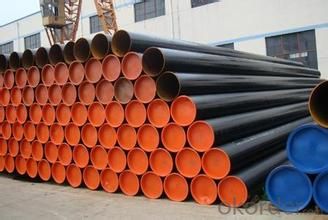
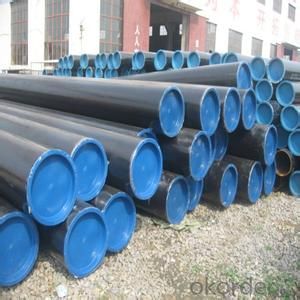
- Q: Can steel pipes be used for underground oil pipelines?
- Yes, steel pipes can be used for underground oil pipelines. Steel pipes are commonly used for this purpose due to their strength, durability, and resistance to corrosion. They are capable of withstanding the high pressure and extreme conditions associated with oil transportation underground.
- Q: Can steel pipes be used for swimming pool installations?
- Yes, steel pipes can be used for swimming pool installations. Steel pipes are known for their durability and strength, making them a suitable choice for underground or aboveground swimming pool plumbing systems. They are capable of handling high water pressure and can withstand the corrosive effects of pool chemicals. Additionally, steel pipes are resistant to extreme weather conditions and can be easily installed and maintained. However, it is important to ensure that the steel pipes are properly treated and coated to prevent rust and corrosion.
- Q: What are the different methods of testing steel pipes?
- There are several methods of testing steel pipes, including visual inspection, ultrasonic testing, magnetic particle testing, liquid penetrant testing, radiographic testing, and hydrostatic testing. Each method serves a specific purpose in evaluating the quality and integrity of steel pipes, ensuring they meet industry standards and are suitable for their intended applications.
- Q: How are steel pipes used in the manufacturing of conveyor systems?
- Steel pipes are commonly used in the manufacturing of conveyor systems as they provide a strong and durable structure for transporting materials. These pipes are used to create the framework and support structure of the conveyor system, allowing for the smooth movement of goods from one place to another. Additionally, steel pipes can be welded together to create longer sections, making them ideal for constructing lengthy conveyor systems.
- Q: Can steel pipes be used for oil wells?
- Yes, steel pipes can be used for oil wells. Steel pipes are commonly used in the oil and gas industry due to their strength, durability, and resistance to corrosion. They are able to withstand the high pressures and temperatures that are encountered in oil well drilling and production. Steel pipes are also able to transport oil efficiently and safely from the well to the surface, making them a preferred choice for oil well infrastructure. Additionally, steel pipes can be easily welded and threaded, allowing for easy installation and maintenance in oil well applications.
- Q: What is the difference between steel pipes and concrete pipes?
- Steel pipes and concrete pipes differ in their composition, construction, and characteristics. Steel pipes are made from steel, whereas concrete pipes are made from a mixture of cement, sand, aggregate, and water. Steel pipes are known for their strength, durability, and resistance to corrosion, making them suitable for high-pressure applications and underground installations. Concrete pipes, on the other hand, are renowned for their affordability, ease of installation, and resistance to fire. They are commonly used in stormwater drainage systems and sewerage networks. Overall, the choice between steel pipes and concrete pipes depends on the specific requirements of the project, such as budget, load-bearing capacity, and environmental factors.
- Q: How are steel pipes repaired if they are damaged?
- Steel pipes can be repaired if they are damaged through various methods such as welding, patching, or replacing the damaged section with a new pipe. The specific repair technique depends on the extent and nature of the damage.
- Q: Can steel pipes be used for underground sewer lines?
- Yes, steel pipes can be used for underground sewer lines. Steel pipes are commonly used in sewer systems due to their strength, durability, and resistance to corrosion. They are able to withstand the weight of soil and other external pressures, making them suitable for underground applications. Additionally, steel pipes have a long lifespan and can effectively transport wastewater and sewage for many years. However, it is important to ensure that the steel pipes are properly coated or lined to prevent corrosion and extend their lifespan even further.
- Q: How are steel pipes used in bridge construction?
- Steel pipes are commonly used in bridge construction as structural elements to provide support and stability. They are often used as piers, piles, or columns to bear the weight of the bridge and transfer it to the ground. Steel pipes are also utilized in the construction of bridge decks and railings. Their strength, durability, and versatility make them essential components in bridge engineering.
- Q: Are steel pipes resistant to fire?
- Yes, steel pipes are highly resistant to fire.
Send your message to us
Seamless Steel Pipe API Certificate Gr B
- Loading Port:
- Tianjin
- Payment Terms:
- TT OR LC
- Min Order Qty:
- 35 m.t.
- Supply Capability:
- 8000 m.t./month
OKorder Service Pledge
OKorder Financial Service
Similar products
Hot products
Hot Searches
Related keywords
